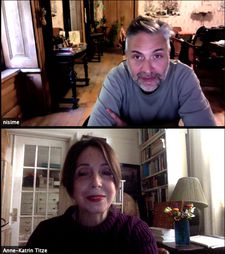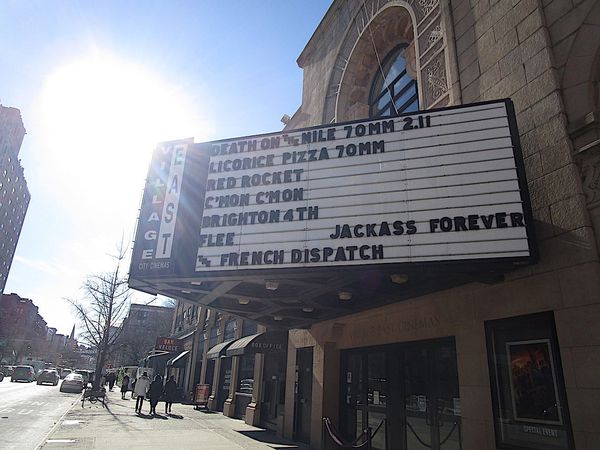On December 21, 2021 the 94th Academy Awards Oscar Best International Feature Film shortlist was revealed with some notable omissions. Nora Martirosyan’s Should The Wind Drop (Si Le Vent Tombe) from Armenia; Julia Ducournau’s Titane from France; Apichatpong Weerasethakul’s Memoria from Colombia; Zhang Yimou’s Cliff Walkers from China; Kira Kovalenko’s Unclenching The Fists from Russia, and Levan Koguashvili's Brighton 4th (screenplay by Boris Frumin, shot by Phedon Papamichael) from Georgia were among those.
 |
| Levan Koguashvili with Anne-Katrin Titze: “The main concern is the cinematic quality of the story.” |
The Tribeca Film Festival International Narrative Competition jury comprised of Alexander Payne, Melissa Leo, Delroy Lindo, Peter Scarlet, and Lesli Klainberg awarded Best International Narrative Feature to Brighton 4th (produced by Irakli Rodonaya, Olena Yershova, Michel Merkt, Kateryna Merkt), Best Screenplay to Boris Frumin, and Best Actor to Levan Tediashvili for his role as Kakhi, the father of troubled son Soso (Giorgi Tabidze).
In the third instalment with Levan Koguashvili, we discuss his earliest film Women From Georgia and its connection to his latest Brighton 4th, a highlight of the 20th edition of the Tribeca Film Festival.
From Tbilisi, Levan Koguashvili joined me on Zoom for an in-depth conversation on Women From Georgia.
Anne-Katrin Titze: Women From Georgia is a great counterpart to Brighton 4th. I noticed that you are not afraid of chaos. Chaos is where you thrive. The more things happen on screen, the more you get to an essence. Is that true?
Levan Koguashvili: Yes, chaos, I think generally, is very cinematic. It’s an opportunity for directing. It’s an opportunity for cutting, also. I remember reading a book about one of my favourite directors, Robert Altman. It talked about why he likes making these group movies with separate stories. He said because whenever I don’t like one story I can cut to another. It’s also an opportunity to hide somewhere in a way in this chaos. The main concern is the cinematic quality of the story.
AKT: You are masterful at layering conversations. I understand even if I don’t know the language, which is remarkable. How do you work with your subtitle person?
LK: Oh, I had an amazing subtitle company, LVT, they are based in New York. Jerry Rudes. They also have an office in Paris.
AKT: Subtitle people don’t get enough credit when they do such a good job.
LK: He was amazing, because I came to him with lots of complicated text and he would sit with me for three or four days editing. It was an amazing process to see how this amazing professional understands what subtitles are about. How he leaves only the most important stuff and shortens it - it was art. At the time it was easier because I lived in New York. After that I always try to find an excuse to work with this guy.
AKT: Especially in the scene when all the women are talking and we don’t even know who says what, the excerpts in the subtitles allow us to get the total gist of the conversation.
LK: He understands cinema and feels that scene, the pace of the scene; it’s so important.
AKT: Are you ever going to make a musical? The singer in the nursing home, who starts crooning Amapola, is still heard over other scenes that would have a very different mood were it not for the music.
LK: Ha, thank you so much! Basically when I went to film school in Russia it was a tough time in the Nineties, so it was not so much about shooting something. They called it stage exercises. Basically we were doing theatre, because I did a Hamlet monologue, excerpts from Carmen and all those Russian classics. Basically I was doing 30, 40 minutes theatre. I always had these music pieces and I enjoyed doing a little bit of dancing and elements of musicals. I don’t know, so many stories are going on in my head right now. Stories from the Nineties and crime movies, which I was to make.
 |
| Levan Koguashvili: “When you have a story with many layers on a philosophical aspect, this is something you want to do, that was the idea of this film.” |
AKT: When you say crime movies, just think of Claude Lelouch’s Le voyou, which begins with a musical sequence before it becomes a crime comedy.
LK: I’m developing a script right now about Nineties post-Soviet Georgia and young guys involved in crime. It’s based on true stories. I just came back from interviews. A guy who was very active at the time, one of those rare persons who survived. When I’m thinking about those times driving, when I hear on the radio a song which I think is relevant to the story, I grab my iPhone and record the song. Usually they are lyrical songs. They don’t have anything to do with crime; what works usually is the opposite. Doing crime scenes with tender music. An opposite is always stronger in a way in terms of approach.
AKT: In Women From Georgia you do precisely that with the young boy performing a song, while we see someone washing an old person.
LK: That’s what works. Usually it’s an emotional understanding of the music and the scene. It’s not conceptual. You listen to the music and understand and then you try in the editing room. It’s intuition and most likely it’s going to work. In this scene with the boy performing, those guys were telling me real stories. This woman was showing me her son singing and I thought it could unite the ending of the movie as well. I had bits of scenes which are not complete scenes, but I didn’t want to lose the little shots, so I thought maybe I can do this little montage in the end where I can put everything? It’s an excuse to do this kind of mosaic of immigrant life.
AKT: Pictures of puppies …
LK: Yes, It belongs together, it’s the same tone, the same tragicomedy of immigrant life.
 |
| Levan Koguashvili: “These kids didn’t understand how hard the efforts were by their mothers to make this money.” |
AKT: You talk about your project on crime in the Nineties. Here one woman says “when things collapsed, so did my husband.” That’s about that time?
LK: Absolutely. It messed up men and activated down-to-earth, very strong women. Nineties is something about strong women and confused men.
AKT: The women are making the sacrifices and working so hard, with two days off a month. You see how hard they work, but at the same time there is an enjoyment in precisely that. Along the lines of: I am the martyr, I give up everything for my family while the men are playing and gambling. You capture that enjoyment so well.
LK: Absolutely. What you noticed I appreciate because it’s why this story was important to me. It had many layers. The enjoyment of sacrifice was one of the layers. It’s also a story of mothers spoiling their kids by sending this undeserved money. These kids didn’t understand how hard the efforts were by their mothers to make this money. There were so many stories of families being spoilt with easy money which was coming from America every month.
One of the questions this story I hope brings up is: what is a clever way of supporting your family? Where is the limit? What is more important, to buy a Mercedes for your son or buy a cheap car and come back earlier to be next to your family? It’s something about materialistic ideas, what’s a priority in your life? I wanted to show these layers as well along with my respect for the sacrifice and the strength of these women. When you have a scene where a mother is singing a lullaby to her child back home, it’s cinematic. And she sees New Jersey scenery from her window along with that. When you have a story with many layers on a philosophical aspect, this is something you want to do, that was the idea of this film.
 |
| Levan Koguashvili: “There were so many stories of families being spoilt with easy money which was coming from America every month.” |
AKT: We talked about your love for signs during our last conversation. Here I noticed the T-shirt the mom with the lullaby is wearing, which is from this old Gap campaign (RED). Her shirt says Da(RED). Did you choose that for her? Did you have any impact on that?
LK: No, it was accidental. I was coming up to the house where she lived and she was wearing this T-shirt. I could have asked her to change the T-shirt but, no, I thought it was absolutely about time, about being in New York. Because it’s something about belonging to this place, the Gap T-shirt; it’s a subculture of the time.
AKT: Your new project is to all take place in Georgia?
LK: The new one yes. Actually before the crime story, which will hopefully be next, we already have a script which is partly financed, which is also basically Nineties but it’s about a beauty contest in a provincial city. That’s my next project because it’s already partly financed and we applied to several European funds and hopefully if we raise enough money, early spring 2022 we start pre-production. The crime story Nineties is hopefully after the beauty contest one.
AKT: Looking forward! Best of luck with your projects and see you next time!
LK: Thanks, Anne-Katrin, for your interest. I really appreciate it.
Read what Levan Koguashvili had to say on his love of Italian Neorealism, working with the amazing Phedon Papamichael, Georgian painter Niko Pirosmani, Frédéric Boyer, Sophia Loren in Lady Liberty, Kakhi Kavsadze and when Georgian men sing, and the comedy of cheese.
Read what Levan Koguashvili had to say on the hearse, Brighton Beach shops, loving signs and the Strand Bookstore, Robert Frank, depth, levels, and action and The Big Lebowski.
Read what Phedon Papamichael had to say on Brighton 4th and Levan Koguashvili’s Blind Dates.
Brighton 4th opened in New York at the Village East by Angelika on January 28 and the run has been extended through February 17 and opened in Los Angeles on February 11 at the Laemmle Royal.
The 94th Academy Awards ceremony originally scheduled for Sunday, February 27 will be held on Sunday, March 27, 2022 at the Dolby Theatre in Hollywood.























